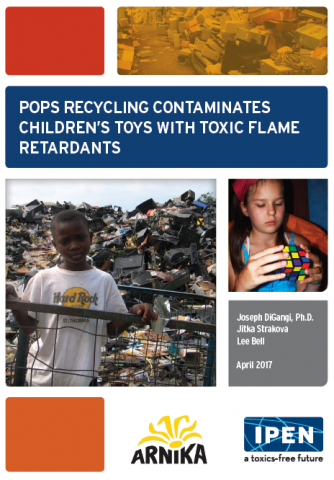IPEN PRESS RELEASE: At UN meeting, Canada and Chile stand alone trying to legitimize e-waste dumping and promote recycling of toxic chemical into children’s products

Geneva: Today, at the Stockholm Convention 8th Conference of the Parties, Chile and Canada surprised delegates by proposing to allow recycling materials containing a toxic flame retardant widely found in electronic waste (e-waste). The proposal violates the Stockholm Convention which explicitly prohibits recycling and reuse of substances on its list.
DecaBDE is used in the plastic casings of electronic products and if it is not removed, it is carried into new products when the plastic is recycled. Toxicity studies indicate potential adverse developmental, neurotoxic, and reproductive effects, and DecaBDE or its degradation products may also act as endocrine disruptors.
Ironically, a new IPEN study1 shows that the toxic recycling policy advocated by these countries widely contaminates children’s products. In fact, in Canada all sampled toys made of recycled plastic contained both OctaBDE and DecaBDE.
“How can these countries advocate a policy that potentially poisons children?”said Pam Miller, IPEN Co-Chair. “Recycling materials that contain toxic chemicals contaminates new products, continues exposure, and undermines the credibility of recycling.”
The treaty’s expert committee has warned against toxic recycling and explicitly recommended to eliminate these substances from the recycling streams “as swiftly as possible” noting that, “Failure to do so will inevitably result in wider human and environmental contamination… and in the loss of the long-term credibility of recycling”
The proposed recycling exemption also is tantamount to legalizing electronic waste (e-waste) dumping in developing countries which is cynically described as “recycling.”
“E-waste is the fastest growing waste stream and now it seems these countries want to make it legal and dump even more,” said Tadesse Amera, PAN Ethiopia. “OECD countries already sends us lots of e-waste and now it seems they want to increase our toxic burden – exactly opposite to the treaty’s goal.”
Contact:
|
Bjorn Beeler, IPEN +46 3179 99 474 |
*******************************
1http://ipen.org/sites/default/files/documents/toxic_toy_report_2017_update_v1_5-final_en.pdf
IPEN is a global network of public interest organizations working in more than 100 countries to reduce and eliminate toxic substances. www.ipen.org twitter: @ToxicsFree
Press Release
How can these countries advocate a policy that potentially poisons children?